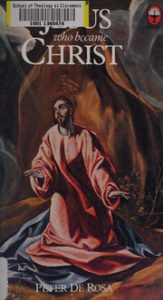
Peter de Rosa is evidently a rationalist who is skeptical about the historical veracity of the gospel accounts of Jesus. He doubts the virgin birth and Jesus’ miracles, rejects the atoning significance of Christ’s death and regards the resurrection accounts as creative stories designed to open the eyes of faith. Not surprisingly, the Roman Catholic Church removed him from his position of Vice-Principal of Corpus Christi College, London.
Nevertheless, de Rosa’s book, Jesus Who Became Christ (Fountain/Collins, 1974) is sprinkled with delicate and evocative verses which show a seeking heart in conflict with a skeptical head – he reminds me of Paul Tillich. Surely, one of the great mysteries of the universe is that some people continue to affirm their adherence to Christian faith, albeit, expressed in figurative and symbolic language, even though they have abandoned the traditional doctrines held during their youthful days, after they have being exposed to critical and corrosive criticism during their theological studies.
Here is a sample of de Rosa’s evocative, heart-felt verses related to the events of the birth, childhood and genuine humanity of the Incarnate Christ.
In the virgin birth, God took hold of a Jewish maiden without a future
My field is desolate, unsown,
My maiden-body quiet as a tomb.
No seeds of life will now be blown
By breath of man into my womb.
But should this dry and fallow field
By a much greater Breath be blown upon
To hallow it, then will it yield
Fruits that will last when yours are gone.
I know that God will richly bless
This hitherto unlovely thing and wild.
My poverty, my emptiness,
Are for God’s and a Virgin’s Child.
Nativity
With God, before the world began,
The uncreated Word in whom we move and are
Was there when sun and moon from darkness sprang;
He watch the kindling of each star.
With man, when darkness conquered light,
The humbled Word made flesh, so small like us, so weak,
Is all the world in his proud mother’s sight,
And from her lips learns how to speak.
——
Sooner than born denied.
Should we pretend
He will not end
Abandoned, crucified?
Life is born in a cave.
Should we disguise
That he will rise
Glorious from his grave?
Swaddled, a manger his bed,
Who could forget
This baby is yet
Judge of living and dead?
——
He learned as other children learn
That knives are sharp and fire will burn,
He learned to talk then sing a song,
Learned right from left and right from wrong.
One day he would be wise and good,
But this took time, as well it should.
He did not want it sooner than
The time it takes to make a man.
——
Finally, de Rosa’s cheeky response to a critic:
I know he was a man but please don’t smile:
He was a member of the Trinity.
And while he couldn’t run a minute-mile,
He had an IQ of infinity.
Related Posts
John Owen on Christ Great Condescension: Divine Glory Veiled in Flesh
Virgin Birth of Jesus Christ. Christmas Fulfilment of Isaiah’s Prophecy
The Virgin Birth of Jesus Christ. Origins and Theological Significance